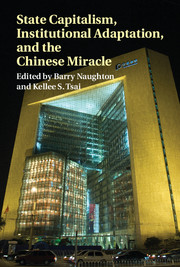Crossref Citations
This Book has been
cited by the following publications. This list is generated based on data provided by Crossref.
Giap, Tan Khee
Anh, Nguyen Le Phuong
and
Denise, Ye Ye
2015.
Development Growth Models for Singapore and Malaysia: A Geweke Causality Analysis.
Journal of Centrum Cathedra: The Business and Economics Research Journal,
Vol. 8,
Issue. 2,
p.
165.
Hubbard, Paul
2016.
Where have China’s state monopolies gone?.
China Economic Journal,
Vol. 9,
Issue. 1,
p.
75.
Malkin, Anton
and
Momani, Bessma
2016.
An Effective Asian Infrastructure Investment Bank: A Bottom Up Approach.
Global Policy,
Vol. 7,
Issue. 4,
p.
521.
Harrington, Jonathan
2017.
China’s Urbanization and Socioeconomic Impact.
p.
145.
Chavance, Bernard
2017.
Ownership Transformation and System Change in China.
Revue de la régulation,
Kim, Pan Suk
2017.
L’évolution de l’administration publique moderne en Extrême-Orient.
Revue Internationale des Sciences Administratives,
Vol. Vol. 83,
Issue. 2,
p.
229.
Gabusi, Giuseppe
2017.
‘The reports of my death have been greatly exaggerated’: China and the developmental state 25 years afterGoverning the Market.
The Pacific Review,
Vol. 30,
Issue. 2,
p.
232.
Kornai, János
2017.
The System Paradigm Revisited.
Revue d’études comparatives Est-Ouest,
Vol. N° 48,
Issue. 1,
p.
239.
Kastner, Scott L.
Pearson, Margaret M.
and
Rector, Chad
2018.
China's Strategic Multilateralism.
Töpfer, Laura-Marie
2018.
China’s integration into the global financial system.
Dialogues in Human Geography,
Vol. 8,
Issue. 3,
p.
251.
Dian, Matteo
and
Menegazzi, Silvia
2018.
New Regional Initiatives in China’s Foreign Policy.
p.
1.
2018.
Fabricating Transnational Capitalism.
p.
319.
Rofel, Lisa
and
Yanagisako, Sylvia J.
2018.
Fabricating Transnational Capitalism.
p.
43.
Duanmu, Jing-Lin
and
Urdinez, Francisco
2018.
The dissuasive effect of U.S. political influence on Chinese FDI during the “Going Global” policy era.
Business and Politics,
Vol. 20,
Issue. 1,
p.
38.
2018.
Fabricating Transnational Capitalism.
p.
345.
Yanagisako, Sylvia J.
2018.
Fabricating Transnational Capitalism.
p.
161.
Rofel, Lisa
2018.
Fabricating Transnational Capitalism.
p.
264.
Rofel, Lisa
2018.
Fabricating Transnational Capitalism.
p.
119.
Yi-chong, Xu
2018.
China’s Giant State-Owned Enterprises as Policy Advocates: The Case of the State Grid Corporation of China.
The China Journal,
Vol. 79,
Issue. ,
p.
21.
2018.
Fabricating Transnational Capitalism.
p.
303.





